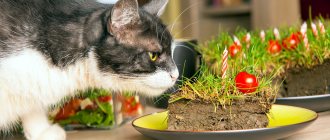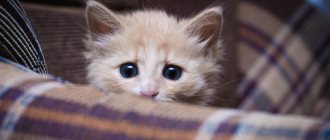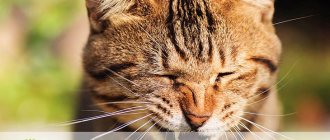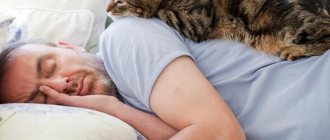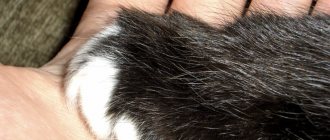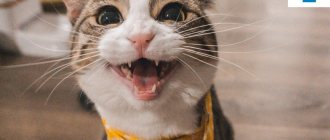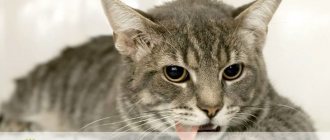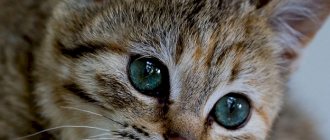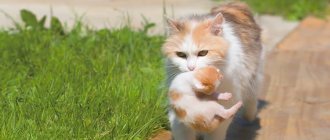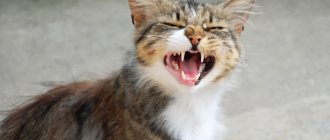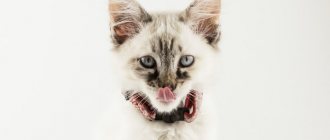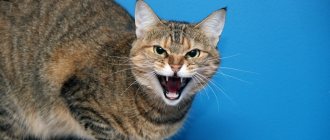July 31, 2019
The desire to provide your pet with high-quality food containing everything necessary for a long and healthy life is familiar to any responsible owner. But what to do if your beloved cat persistently continues to crunch on his “crackers”, flatly rejecting all other foods and treats? Is it harmful to feed a cat only dry food? Let's figure it out.
Despite the fact that dry pet food has long conquered the pet market, many cat owners are still skeptical about these products. It is especially difficult for people of the “old school” to believe that these small granules can contain all the vitamins, minerals and other biologically significant elements that an animal needs. In addition, such food seems too monotonous.
Misunderstanding of the concept of dry food leads to the birth of numerous myths and incorrect use of commercial diets. In particular, many owners believe that a dry diet must be supplemented with something, otherwise the cat may not receive enough nutrients.
Stress
The most obvious and common answer to the question why a cat doesn’t eat food is stress.
- It must be taken into account that furry pets are no less susceptible to this phenomenon than people; they can react strongly to even the slightest changes in the home and the character of the owner.
- If there is a renovation or rearrangement of furniture in the house, quarrels and changes in the behavior of the owners, the cat will experience stress, which may cause a temporary refusal to eat.
The way out of the situation will be increased affectionate treatment of the animal, new toys and regular stroking. This will be enough to make the cat feel better and regain its appetite.
Power change
This option is very common when food is replaced with another. Even changing the brand of food without changing tastes can cause a temporary refusal of food. This is due to the fact that the cat is already accustomed to a certain food, and it will ignore the appearance of a new type of food, considering it unsafe.
- To prevent this from happening, the transition to another type of food should be started gradually, gradually adding new food to the old one so that the pet gradually gets used to the new tastes.
- Each time you need to increase the dosage of the new food and reduce the dosage of the old one. This continues until a complete transition to the new food occurs.
It is necessary to carefully monitor the condition of the animal; if the pet drinks water well, but does not eat, there is no need to worry, it just needs time to get used to the new type of food.
what can you do
Whether your cat is sick, anxious, or just picky, remember that not eating at all can have devastating consequences.
Therefore, even if you are trying to get your cat to adhere to a doctor-prescribed diet, never force it to eat a certain type of food.
If your cat is not eating due to illness, work with your veterinarian to develop the best diet for your pet.
This may include changing the type or consistency of food; Some cats can be enticed to eat by offering them canned food.
In more extreme cases, veterinarians may prescribe medications that act as appetite stimulants or recommend feeding the cat a liquid diet from a syringe.
Or your veterinarian may recommend inserting a feeding tube to ensure adequate nutrition.
If the cause is not illness, you can try to encourage your cat to eat.
You may have discovered that certain foods, such as liver or canned tuna, can act as appetite stimulants in certain cats.
Remember to only offer these products in small quantities. Large amounts can harm your pet by causing deficiencies or excesses of certain vitamins.
Instead of relying on human food, try training your cat to eat commercially produced canned food.
You may find that heating the food or adding fish oil, broth (make sure it doesn't contain onions, which are toxic to cats), or a boiled egg may tempt your picky cat to eat.
If your cat still won't eat, remove the food and bring fresh food in the afternoon. If food hardens and becomes stale, your cat may learn to avoid it in the future.
If your cat has been exclusively eating human food, be sure to transition your pet within a few weeks by mixing your pet's favorite food with cat food.
Over time, you can adjust this ratio until your pet is eating only cat food.
Many experts recommend rotating your cat's diet between different brands two to four times a year using a similar technique.
This practice can help reduce picky eating habits, as well as minimize the development of food allergies and gut problems.
Thermoregulation
This reason occurs in the summer, when it is hot outside. However, it can also occur in winter, if the house has central heating, which warms the house well. The reason for refusing to eat is very simple: the cat is hot and doesn’t feel like eating at all. You need to make sure that she always has water in her bowl.
- If she regularly drinks water, but eats little, there is no need to worry, these are features of thermoregulation.
- This is due to the fact that the more food a pet eats, the more heat its body will generate, which will be quite difficult to cope with.
- Lack of nutrition can be observed for 1 to 3 days. During breaks, your pet may eat a little, this is normal.
Reasons for refusing to eat?
Do not force-feed your cat unless you know the reasons for refusing food! In many situations, hunger will save your pet from complications. A lot can be said about the reasons for refusing to eat, since there are hundreds of them. Let's look at the most popular ones.
During transition periods - the end of winter, the beginning of summer, the cat may not eat on its own initiative. A healthy cat monitors its weight and loses excess fat before the season in which increased activity is needed. A young cat may refuse to eat due to puberty, hormonal imbalance, fatigue, etc.
If your pet played very actively the day before, jumped, ran, and could not calm down, there is a high probability that he feels so-called muscle soreness. It is known that cats may refuse to eat due to pain .
nursing cats may refuse to eat , but the reason is still the same - fatigue. It is more important for your pet to get a good night's sleep and rest; she will be able to eat afterwards. In a state of deep sleep, the cat's immunity works in full force. Some suffer from weather dependence and may refuse food due to headaches. This can only be confirmed by observing your pet during weather changes and sudden changes in atmospheric pressure.
Stress is one of the most common causes of hunger in cats. The problem is that it is difficult for an owner to identify stressors unless they are obvious. You need to start from the fact that the cat is irritated by any changes in the daily routine. For example, if you have noisy guests, and then the cat refuses to eat, the reason is most likely stress.
Worms are the cause of constant intoxication of the body. A cat that is in a constant state of poisoning is unlikely to have a good appetite. Prevention of worms should be carried out at least once every 3 months, even if your pet does not go outside. With prolonged infestation by worms, the opposite picture can also be observed - a strong, perverted appetite. At the same time, the cat is constantly hungry, eats a lot and loses weight. The reason is metabolic disorders and severe vitamin deficiency.
Diseases of the teeth and oral cavity - a pet may look completely healthy in appearance, but refuse to eat due to toothache. Elementary, it is painful for a pet to chew if his tooth is destroyed, pulpitis has developed, or the mucous membranes of the oral cavity have been irritated. Carefully inspect your pet's mouth for irritation. A putrid odor from the mouth indicates the process of decay of the tooth(s) or serious digestive problems.
With congestion in the intestines, the cat may also refuse to eat due to a feeling of constant heaviness.
Sexual desire
One of the reasons why a cat eats little may be sexual desire. About a week before her heat, she may begin to eat significantly less, gradually giving up food altogether.
This behavior is normal for cats; they spend all their energy sleeping and calling for a partner. Cats, in turn, can also refuse food if they sense a nearby cat calling for a partner.
If the animal experiences sexual desire too violently, it is recommended to show it to a veterinarian; it is likely that there are some complications.
What to do if the cat doesn't eat
In each specific case, when a cat has stopped eating its favorite food, the behavior of the owners and treatment should be individual and justified.
The first rule is that you should not try to force feed an animal until you have found out the exact reason for the hunger strike.
Feeding with a syringe or spoon is allowed only as prescribed by a doctor. Only a veterinarian can make an accurate diagnosis. If the doctor identifies a disease, he will prescribe treatment.
Pregnancy education
Pregnant cats, as a rule, on the contrary, try to eat more in order to provide nutrients for themselves and their future offspring.
- However, if the cat does not eat or drink, or its appetite has worsened, it should be shown to a specialist.
- He will conduct an examination and find out the reason for refusing food.
- You should not delay your visit; after a day of fasting, you should consult a doctor.
Why is refusing food dangerous and when is hunger normal?
In normal condition, a cat eats 2 times a day, at the same time. If your pet has a regular eating schedule, he won't feel hungry at other times. If a cat does not eat anything for pathological reasons, the owner will notice rapid weight loss, weakness and drowsiness of the pet.
Please note that even a slight malaise, high temperature, pain, discomfort, stress is a serious reason for a pet to refuse food. In the case when the pet’s desires are influenced by external factors (stress, unfamiliar surroundings), it is useless to persuade the cat to eat.
As soon as the pet gets into a familiar atmosphere and comes to its senses, the problem with nutrition will be solved by itself.
An adult cat may fast on its own initiative for 20 to 24 hours. The reasons can be varied, such as bloating, indigestion, excess weight, bad weather, etc. If the cat does not eat for more than a day and looks boring, you should consult a doctor. What to do if a trip to the vet is impossible and how not to harm your pet?
First you need to assess the damage, that is, understand whether your cat is losing weight. Since not all owners know how much their pets weigh, attention should be paid to secondary factors:
- Condition of the coat – a healthy cat’s coat is shiny, does not bristle, does not fall out, and looks moisturized.
- Condition of the mucous membranes - when you lose strength from hunger, the mucous membranes look pale, discolored or transparent (palate, gums)
- Activity – an exhausted cat avoids games, sudden jumps and maneuvers. The pet tries to sleep more.
- Body temperature - if a cat is sick, its body temperature rises; when it loses strength from hunger, its base body temperature decreases due to a drop in the level of hemoglobin in the blood. The pet tries to sleep curled up in a ball, looking for warmer places: heating radiators, closets, etc.
With a pathological refusal to eat (due to illness), the cat very quickly loses muscle mass.
You can tell if your cat has lost weight by examining and feeling it.
- The first signs of thinness are literally visible on the face, but not in all breeds.
- Feel the cat's spine and croup; the bones should not protrude too much, but should be palpable.
- When there is a loss of strength, an incorrect position of the elbows and hock joints is often observed - they are tucked in or turned out.
In a cat in normal physical shape, the ribs are not visually visible, but can be easily felt.
When palpating, pay attention to the condition of the skin. One sign of exhaustion is dehydration . A lack of water in the body can occur even if the cat drinks. A dehydrated pet's skin becomes rougher and loses elasticity. In the opposite situation, with edema , the skin is loose and slowly takes its normal shape after deformation.
Parasites in the gastrointestinal tract
One of the common reasons why a cat eats poorly and loses weight is considered to be parasites in the pet’s stomach and intestines. This is especially true for those animals that were picked up from the street or are regularly there. Pets are also susceptible to this threat because they may come into contact with contaminated food.
- In this case, the cat begins to eat and drink less than before, but the belly will gradually grow.
- This is due to the fact that the parasites have bunched up in the intestines or stomach, thus creating constipation.
- The animal cannot go to the toilet, and therefore begins to eat less.
It is recommended to show it to a doctor on the second day of fasting so that he can perform an ultrasound of the abdomen and determine the cause.
Diseases
Sometimes the cause of lack of appetite can be diseases of the oral cavity or internal organs. You need to carefully monitor the behavior; if the animal regularly approaches the bowl, tries to eat, but fails, it means something hurts. Symptoms also include apathy and lethargy.
This reason cannot be delayed; it is best to diagnose and begin to treat diseases at the initial stage of their development, before they have time to cause significant harm to the body.
Food poisoning
A rare reason, but one that also occurs among others. Symptoms of poisoning may include discharge from the eyes, mouth and nose, vomiting, loose stools or no stools at all.
The animal may also be lethargic, its eyes clouded, it refuses to play and does not pay attention to almost anything.
Vomiting in itself is not a reason to suspect poisoning. The gag reflex in animals is much better developed than in humans.
If after vomiting the pet behaves actively, its behavior does not change, then it simply got rid of hairballs in the body, which is natural. If after vomiting the pet is apathetic, perhaps it has been poisoned by something or swallowed a foreign object, it is necessary to do an ultrasound of the abdomen as soon as possible.
Recommendations
If the cat does not eat dry food or wet food for 1 to 3 days, there is no reason to worry.
- An adult, healthy individual can fast for up to 5 days without harm, provided there is a sufficient amount of clean drinking water.
- Kittens can fast for up to 1 day, old cats for up to 2-3 days maximum.
In addition to dry food, the cat only needs water
In fact, the only supplement dry food needs is fresh, clean, unlimited drinking water. Some people buy a drinking fountain, some place containers of water around the house, and some even soak dry food in water - and this is normal. Dry diets do not need any other additions - it’s not for nothing that they are called complete and balanced.
More than a dozen specialists work on their compositions, who carry out strict quality control at all stages of production, ensuring that the final product contains all the necessary micro- and macronutrients and meets all the needs of the animal.
The main thing is to choose dry food that will be suitable specifically for your cat (according to its age, breed and other characteristics), and follow the manufacturer’s recommendations regarding the correct dosage of dry food (usually they are indicated on the packaging). After all, overfeeding, like underfeeding, is not conducive to cat health, and the veterinary community around the world is sounding the alarm about the epidemic of obesity in pets.
It is precisely the uncontrolled addition of any other products to dry food that is the most common cause of this serious disease, as well as digestive disorders or more serious problems. In addition, it should be added that cats are by nature very conservative animals.
Even the composition of dry food is much more varied than their diet in their natural habitat. Therefore, as a rule, cats are in no hurry to try new, unknown foods and are distrustful of the tidbits that the owner offers. Some people mistake this cat behavior for being spoiled and too selective, but in fact, cats simply do not need variety in their food.
